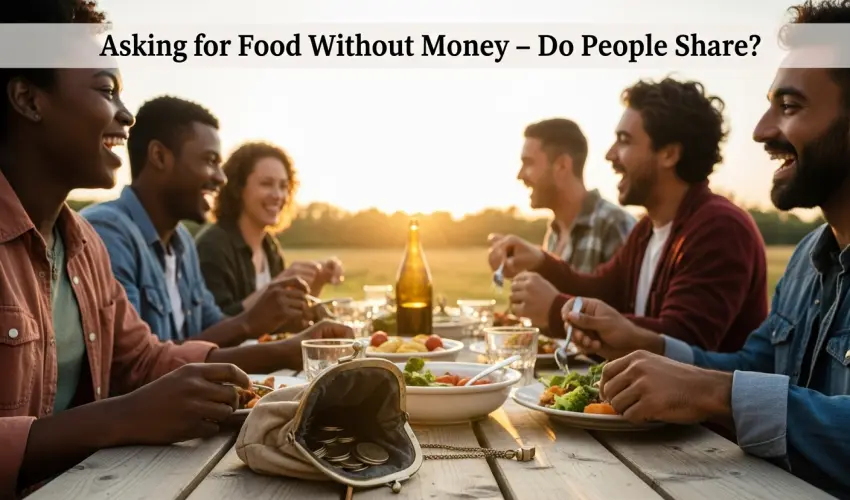Asking for Food Without Money – Do People Share? A Look into Human Generosity
"Can you spare some food?" This simple question is the basis for powerful social experiments on human kindness. Discover whether people share with those in need and what their reactions reveal about empathy, culture, and our shared humanity.
Key Takeaways
-
Asking for food without money is a powerful test of human empathy, generosity, and societal values.
-
The response often depends on cultural background, personal appearance, location, and the context of the request.
-
Social experiments reveal both heartwarming generosity and alarming indifference.
-
Community efforts like “suspended meals” and food-sharing platforms offer systemic ways to show compassion.
-
True kindness isn’t just about giving; it’s about seeing the humanity in every person.
Introduction: A Simple Request That Speaks Volumes
Picture this: you're hungry, broke, and all you want is a warm meal. You take a deep breath, walk up to a stranger at a café, and ask, "Excuse me, can you spare some food? I don’t have any money."
What happens next can be unpredictable and deeply revealing. This simple request has become a powerful social experiment, exposing how society views hunger, need, and strangers. But do people really share? And what does their response say about us?
The Social Experiment: A Test of Our Conscience
Content creators and social psychologists have staged numerous experiments where individuals pretend to be hungry and ask strangers for food. The results are a mixed bag.
-
In some videos, people walk past, ignore, or even mock the request.
-
In others, strangers offer full meals, heartfelt encouragement, or even sit down to share a conversation.
This stark dichotomy between generosity and indifference forces us to ask: why do some people share while others don’t?
Human Reactions: From Kindness to Cold Shoulders
When People Share
Those who offer food often do so instinctively, driven by:
-
Empathy: They can imagine the pain of being hungry.
-
Past Experience: They recall a time when they, too, needed help.
-
A "Pay It Forward" Mentality: They believe in spreading kindness.
Interestingly, people with limited resources themselves—like street vendors or minimum-wage earners—often show the greatest generosity, a powerful reminder that empathy isn’t based on wealth.
When People Don’t Share
Refusals are often justified with excuses like, “Sorry, I don’t have cash” (even when asked for food, not money) or, “Go to a shelter.” Sometimes, people fear scams or feel emotionally detached and uncomfortable confronting poverty face-to-face.
The Uncomfortable Truth: Appearance and Perception Matter
How someone looks plays a huge role in whether they receive help. An individual in clean clothes might be seen as temporarily down on their luck, while someone appearing homeless may be stereotyped and ignored. One viral experiment showed a man in a suit receiving food offers in minutes, while the same man in shabby clothes was overlooked for hours. This reveals a difficult truth: society often helps those who "look" deserving.
Grassroots Giving: Systems of Compassion
Beyond spontaneous acts, some communities have institutionalized generosity:
-
Suspended Meals: Originating in Italy as “caffè sospeso” (suspended coffee), this tradition allows customers to pay for an extra meal or drink for someone in need.
-
Community Fridges: In many urban neighborhoods, refrigerators are stocked with free food donations on a "take what you need, leave what you can" basis.
-
Pay-It-Forward Chains: At drive-thrus and cafés, strangers pay for the next customer’s order, creating a simple, anonymous, and impactful chain of kindness.
The Psychology of Giving: What Drives Us to Help?
What compels a person to share with a stranger? It’s not just about kindness; it’s about identity and values.
-
Empathy: Imagining someone else's suffering is a powerful motivator.
-
Moral Self-Image: People want to see themselves as "good." Giving reinforces their self-concept as a kind and generous person.
-
Reciprocity: Some believe in karma—that what goes around, comes around.
On the flip side, fear, cynicism, or emotional fatigue can block generosity, especially in big cities where people can become numb to constant need.
Conclusion: The Heart of Humanity Lies in a Simple “Yes”
When someone asks, “Can you spare some food?” it’s never just about the sandwich. It’s about dignity, recognition, and the belief that every person matters.
Yes, the world can be cold. But in those moments where someone chooses to share instead of walk away, we see the very best of humanity. If kindness were a currency, giving a meal might be the richest thing we ever do.
Join the conversation
Share how this story resonates with your journey. We feature standout reflections in our newsletter.

